We were in a group of 7 people, embarking on a trip to Japan for a 10D9N free and easy grand tour, covering Tokyo (東京), Hakone (箱根), Kyoto (京都), Osaka (大阪) and Hiroshima (広島). For most of us (except for one), it was our first trip to Japan, and we were all excited about it. We took a midnight ANA flight to Tokyo, arriving Narita International Airport Terminal 1 at around 8.45am.
 |
| Arriving Narita International Airport Terminal 1 |
The immigration clearance was relatively fast and smooth, as they were not many passengers around that time. After we retrieved our check-in luggage, we took out our winter clothing and wore them as it's going to be cold outside. We followed the directional sign towards the
Keisei Skyliner train station (situated together with the Narita Express), which we had already pre-purchased the return tickets online. We exchanged for the reserved seat tickets and prepared to depart for Ueno (上野) in Tokyo.
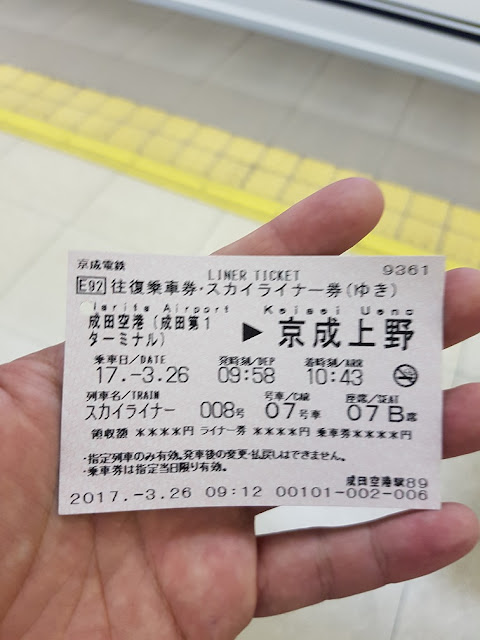 |
| Keisei Skyliner Ticket |
 |
| At Keisei Skyliner Station (Narita Airport Terminal 1) |
Ueno (上野)
The
Keisei Skyliner is one of Japan's fastest high speed train (except for Shinkansen 新幹線), taking only 45 min from Narita Airport Terminal 1 Station (成田空港駅) to Keisei Ueno Station (京成上野駅). In between, it only stops by Narita Airport Terminal 2/3 and Nippori stations. The train has large luggage storage space, which we could store some of our large luggage. The seats are cozy and the leg space is generous, which ensure the journey is comfortable. Free Wifi is also available on the train.
 |
| Inside the Keisei Skyliner train cabin |
As we arrived the Keisei Ueno Station (京成上野駅), it was drizzling outside and the weather was really cold. We proceeded to the nearby Ueno Station (上野駅) to exchange for our
Japan Rail (JR) Pass and make the seat reservations for our subsequent Shinkansen rides.
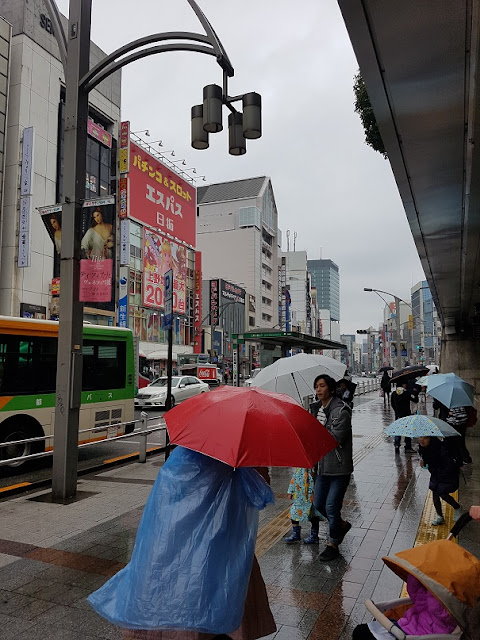 |
| Wet weather outside Keisei Ueno Station |
The
JR Pass is a very cost effective rail pass for long distance travel in Japan. It can be used by foreign tourists only, and offers unlimited use of JR local trains and Shinkansen (except for Nozomi and Mizuho trains) for one, two or three weeks at different prices. The pass can only be purchased outside of Japan. We had purchased the 7 days pass (Ordinary) and required to exchange the vouchers for the actual pass at the Information Centre located at the Central Gate. The queue to exchange the JR Pass was long and it also took us some time to fill up the forms too.
 |
| Central Gate at Ueno Station (The counter to exchange JR Pass is just on the left in the photo) |
After we got our JR Pass (activated for use the next day), we immediately went to the JR Reservation Ticket Office by the side to reserve the Shinkansen seats for our entire trip, total 6 Shinkansen train rides. By the way with the JR Pass, it is free of charge to make the seat reservations for the Shinkansen rides. For every seat reservation made, there will be stamp made on the pass to indicate the date of the travel.
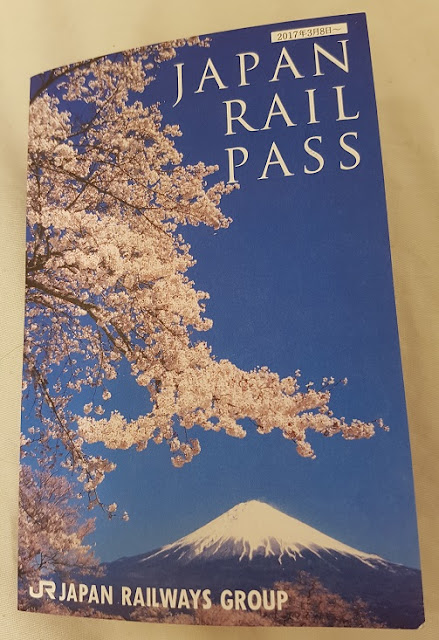 |
| JR Pass (Front) |
 |
JR Pass (Back), showing the pass validity and seat reservation stamps
|
After we were done with the "admin" stuff, we pulled our luggage along and walk towards our Airbnb apartment, located near the Okachimachi JR Station (御徒町駅). When we went inside the apartment, the Airbnb host was still cleaning the place. It was great that we had the opportunity to meet-up our host. We only had a short stay just to deposit our bulky luggage before we depart the apartment to have our lunch.
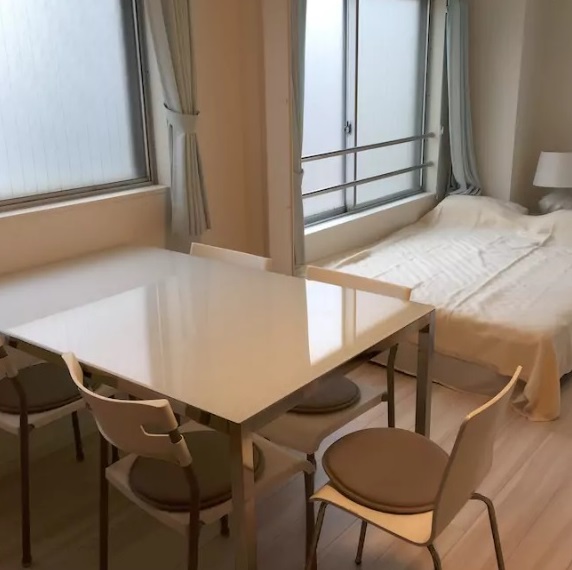 |
| Our Airbnb apartment in Ueno (Source: Photo from Airbnb.com) |
Matsuzakaya Ueno Departmental Store (松坂屋 上野)
We walked to the nearby Matsuzakaya Ueno Department Store (松坂屋 上野) in search for a place to have our lunch. We initially went to the basement, where there's many small stalls selling beautifully packaged bento, sushi, pastries, snacks and fruits etc, which were not exactly the kind of main meal we were looking for. In addition, there are not many seats available.
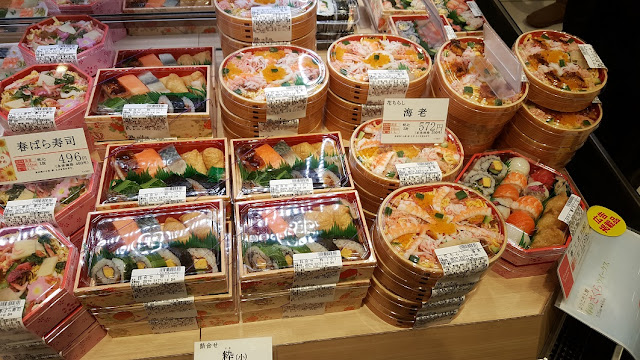 |
| Beautifully packaged Sushi bento on sale in Matsuzakaya Ueno |
Eventually we went to the 7th floor to a restaurant called Katoreya (お好みダイニング カトレヤ), where they sell a wide variety of Japanese food, such as unagi, bento set, sushi, soba set, tempura set, curry tonkatsu (pork cutlet) and even Chinese cuisine.
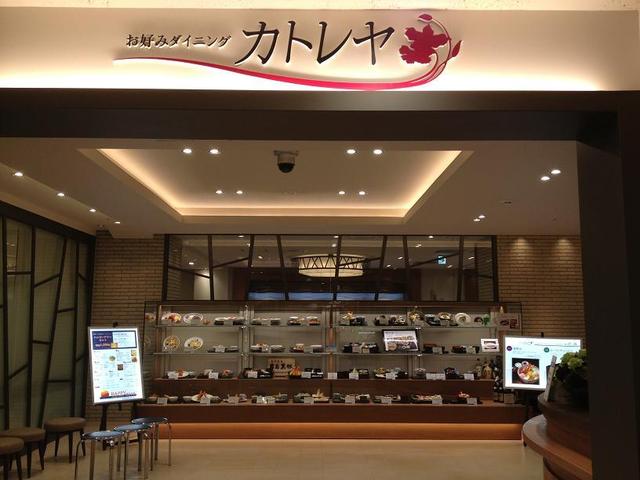 |
| Matsuzakaya Ueno Katoreya (Source: Photo from tabelog.com) |
They have English menu, which was a savior for us, because their staff do not speak English. However, the service of their staff was very good, attending to our needs very quickly. Most of us ordered the curry tonkatsu, omu curry rice and soba set meals, which were delicious and filling.
 |
| Curry Tonkatsu Set |
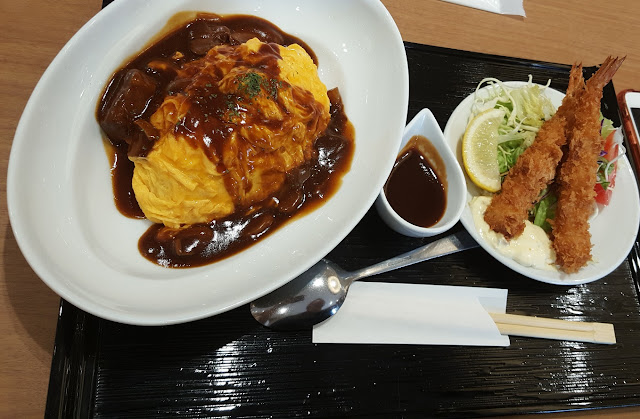 |
| Omu Curry Rice with Prawn Tempura Set |
After the lunch, we made our way to the basement which had a linkway to the Ueno-Hirokoji Metro Station (上野広小路駅) to travel to our next destination.
When we arrived at the Ueno-Hirokoji Metro Station (上野広小路駅), we purchased the PASMO (IC Card) from the ticket machine, which comes with English instructions. It is one of the contactless rechargeable pre-paid card (similar to Singapore's EZ-Link Card and London's Oyster Card) that can be used on the trains, bus, convenience shops, vending machines etc. The same card can also be used across major cities like Tokyo, Kyoto and Osaka. We purchased the card with an initial Yen 500 deposit and top-up for another Yen 6500 to cover for the transportation fee for our entire trip. Note that the
JR Pass cannot be used on subway lines in Tokyo, Kyoto and Osaka.
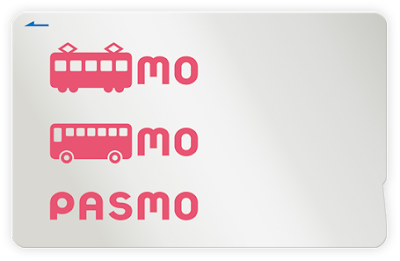 |
| PASMO IC Card |
 |
| Waiting for the train at Ueno-Hirokoji Metro Station |
Nakamise-Dori Shopping Street (仲見世通り) and Senso-ji Temple (金龍山浅草寺)
We departed the Ueno-Hirokoji Metro Station (上野広小路駅) by the Ginza Line to Asakusa Metro Station (浅草駅), to visit our first attraction, the Nakamise-Dori Shopping Street (仲見世通り) and Senso-ji Temple (金龍山浅草寺). The Senso-ji Temple (also known as Asakusa Kannon Temple) is Tokyo's oldest temple (built in 645 AD) and today a very popular tourist attraction. It is dedicated to the Buddhist Bodhisattva Kannon, also widely known to the Chinese as Guanyin, Goddess of Mercy. The temple is also the centre of the Sanja Matsuri (三社祭), a grand religious celebration. During the celebration parade, followers would carry the Mikoshi (神輿), a divine palanquin that serves as the vehicle to transport a deity in Japan, to the shrines. Just before we depart the Asakusa Metro Station (浅草駅), we actually saw the Mikoshi (神輿) on display behind the glass window in the station, but unsure if it is the actual unit or just a replica.
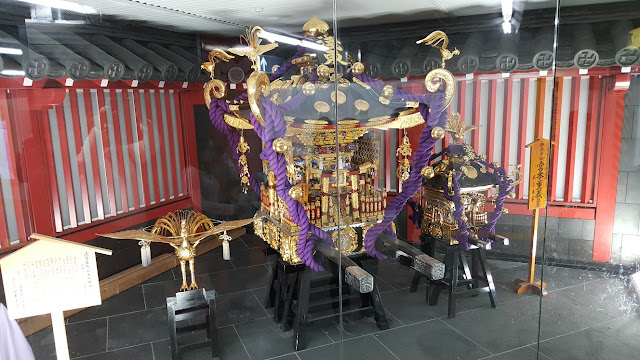 |
| Mikoshi on display in Asakusa Metro Station |
Within a short walking distance, we had arrived at the Kaminarimon (雷門), which is the main gate entrance to Senso-ji Temple (金龍山浅草寺), where there was a large crowd of visitors gathered. The Kaminarimon (雷門) is very striking, with a giant red paper lantern (which was donated by the founder of Panasonic) in the middle of the gate. We could also see many Japanese girls dressed in the traditional kimono going to pray in the temple. Many foreign tourists actually approached them to take photographs with them too.
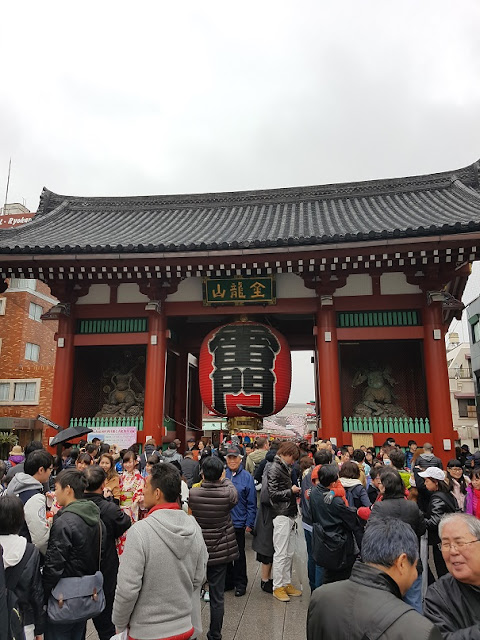 |
| Kaminarimon, the main entrance gate to Senso-ji Temple |
 |
| Rear side of Kaminarimon |
After the gate, we had to pass through the Nakamise-Dori Shopping Street (仲見世通り), which is 250m long flanked by many small shops by the sides, selling Japanese snacks, souvenirs, toys, accessories etc.
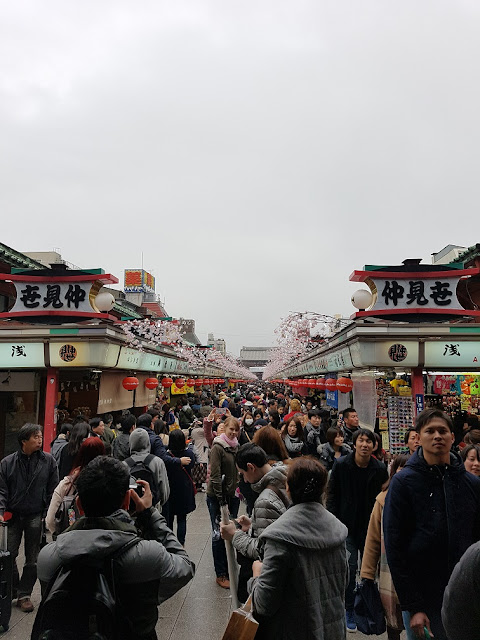 |
| Nakamise-Dori Shopping Street |
After brushing through the crowd and pass the Hozomon (宝蔵門), we finally reached the Senso-ji Temple (金龍山浅草寺) at the end of the street.
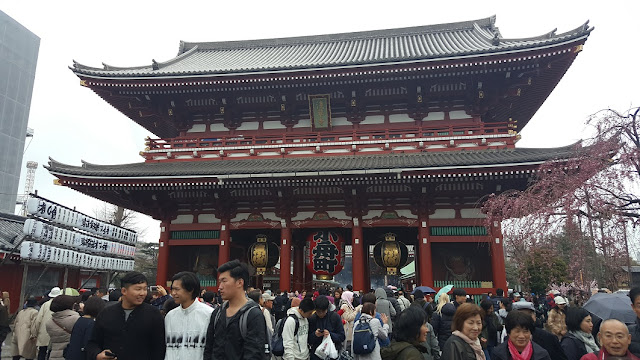 |
| Hozomon, the inner gate |
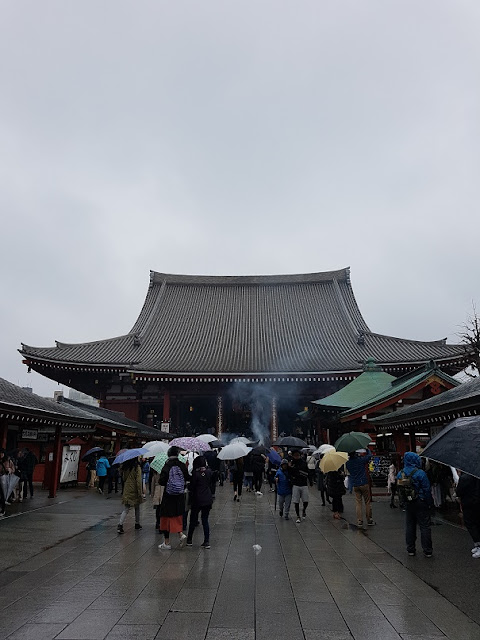 |
| Senso-ji Temple Main Hall |
Like many other shrines and temples in Japan, there are counters by the sides to sell wishing or blessing charms, incense and religious books. We went inside the main hall, where the statue of Kannon is enshrined. This is where the Japanese made their prayers to the Kannon. We left the main hall shortly and returned to the Nakamise-Dori Shopping Street (仲見世通り), stopping by occasionally to buy some snacks and souvenirs.
 |
| Partially bloomed Cherry Tree near the Hozomon |
Our original plan next was to visit the nearby
Tokyo Skytree. However, as it was still drizzling and the sky cloudy, we could barely see the tower from Asakusa. Since the main objective of visiting the Tokyo Skytree was to visit the observatory, we knew we won't be able to see anything from the observatory under such weather condition. As such, we decided to skip this attraction and proceed to the next one, Tokyo One Piece Tower. We departed Asakusa Metro Station (浅草駅) by the Ginza Line, interchange at Ginza Metro Station for the Hibya Line to Kamiyacho Metro Station (神谷町駅).
Tokyo One Piece Tower
The Tokyo One Piece Tower is an indoor theme park for the popular Japanese manga series, One Piece (ワンピース), and it is located inside the "Foot Town" building at the base of the Tokyo Tower (東京タワー). Frankly speaking, I am not a fan of the One Piece manga and I have not watched before too. However, some of our group members are fans of the manga, thus we still have this visit in the travel plan. The
Tokyo Tower (東京タワー) itself is a Paris Eiffel Tower inspired steel tower, and is Japan's second tallest structure, standing at 332.9m. It has observatories on the 150m and 250m level, so we thought we could visit the observatory during the night time if we still have the energy and time to do so. From the Kamiyacho Metro Station (神谷町駅), it is another 10min walk to the tower. Along the way, we could already see the majestic orange-white colour tower, which we stopped by occasionally to take photos.
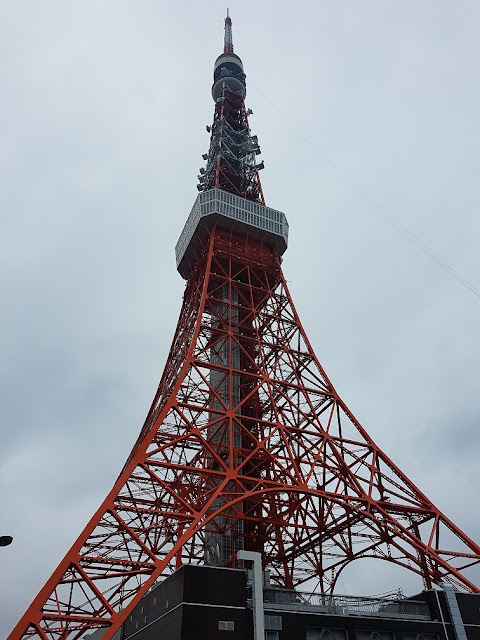 |
| Tokyo Tower |
As we reached the Foot Town, we took the lift to the 3rd storey, which the entrance to the theme park is located.
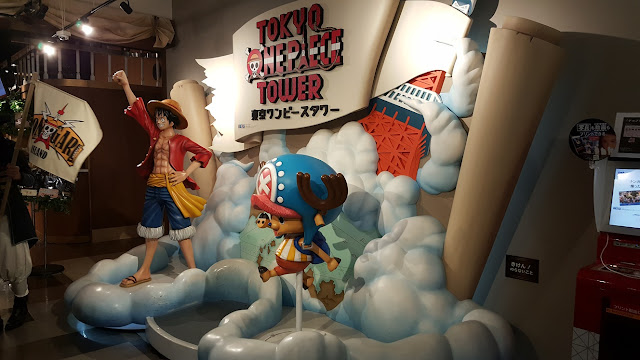 |
| Photospot at the entrance of Tokyo One Piece Tower |
After we purchased the tickets (which includes the One Piece Live Show), we were brought into the 360 Log Theater, which is the first place that all visitors have to pass through. It is a 360 degree all round screen that shows the log of the "Straw Hat Crew" adventures.
 |
| Waiting to enter the 360 Log Theater |
After the short show, an exit opens which we set sail to the Tongari Island!
The next area is the Tongari Port, which depicts the scene of the Tongari Transponder Snail and the Straw Hat Crew holding a feast. This is a great photo spot where visitors can take photographs with the main characters of the One Piece manga, such as Monkey D. Luffy, Roronoa Zoro, Nami, Vinsmoke Sanji, Tony Tony Chopper, Nico Robin, Franky, Usopp and Brook.
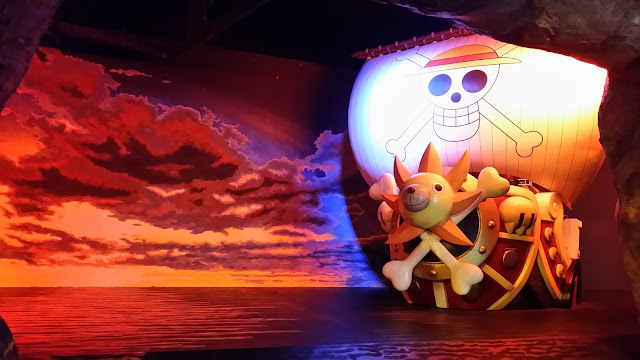 |
| Thousand Sunny arrived at the Tongari Island |
 |
| Straw Hat Crew holding a feast |
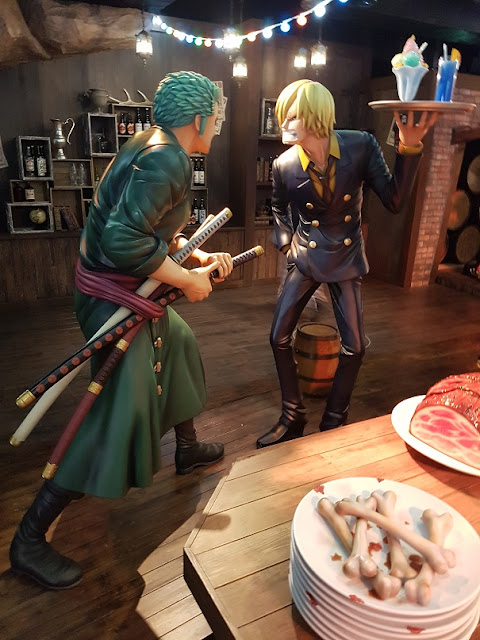 |
| Zoro and Sanji |
 |
| Brook |
 |
| Franky |
The queues and waiting time for some of the attractions were very long, therefore we did not manage to complete all the attractions. We started off with the Chopper's Thousand Sunny Tours. It is a walk-through of the Straw Hat Crew's ship, exploring the different parts of the ship.
 |
| Chopper's Thousand Sunny Tours |
At the kitchen, we could see Sanji and a big shark laid on the table.
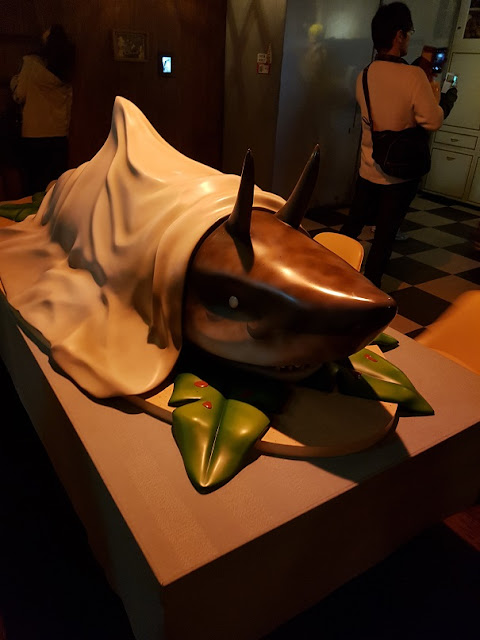 |
| A shark meal? |
 |
| Sanji in the kitchen |
Next is Nami and Robin's Bedroom, followed by the Large Bathroom where visitors could see the silhouette of Nami bathing inside. If you try to peep inside, Nami might catch you and give you a scolding!
 |
| Nami's clothes |
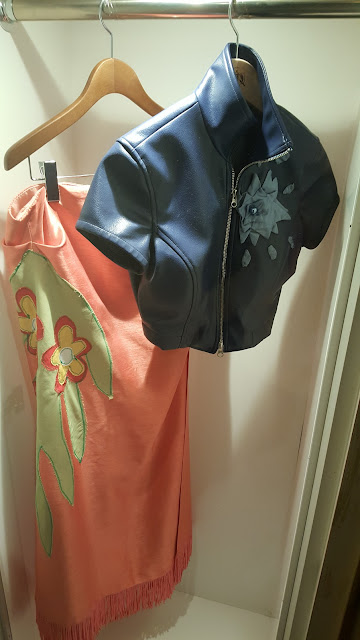 |
| Robin's clothes |
Next, we visited the Zoro's Soul of Edge, which is an interactive game where visitor is given a sword and you have to slash the incoming cannons flying from the warships. Lastly, you have to defeat the last boss with the special move, "Phoenix of the 36 Earthly Desires".
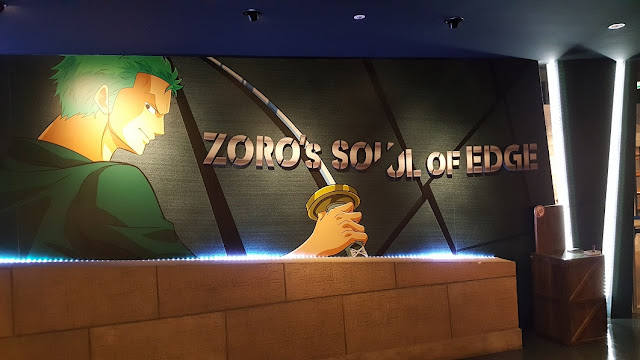 |
| Zoro's Soul of Edge |
Just at the entrance of the attraction, we could see many swords of Zoro and others exhibited there.
 |
| Swords on display |
Next attraction is the Brook's Horror House. Visitors will be given a "Salt Ball" and walk through a dark area area full of zombies. Lastly, you have to put the "Salt Ball" into the mouth of a zombie located near the exit to complete the game.
 |
| Brook's Horror House |
The last attraction we visited was the Nami's Casino House. There is a total of 3 games (race, roulette and quiz), which visitors place their bet with the 4-coloured buttons on the panel in front of them. The player with the highest score would win a special VIP card.
 |
| Nami's Casino House |
As the timing for the One Piece Live Show was approaching soon, we made our way to the 5th storey, where the show is located. The show features real people dressed in various characters of the One Piece manga on their adventure on the Tongari Island, coupled with special effects, LED lightnings and projection mapping.
 |
| One Piece Live Show |
The show was truly entertaining and interactive, which all of us enjoyed, despite that we don't really understand Japanese.
Dinner at Tokyo Tower
After the One Piece Live Show, it was dinner time and we exited the theme park in search for a dinner place. Just outside the entrance of the Tokyo One Piece Tower, there's the Tokyo Tower Official Shop Galaxy, which we spent some time shopping around for souvenirs and accessories related to the Tokyo Tower. On the 1st storey, there are 2 One Piece themed restaurants, Sanji's Oresama Restaurant (which offers All-You-Can-Eat buffet) and Cafe Mugiwara (which sells pizza, sandwiches, cakes and desserts).
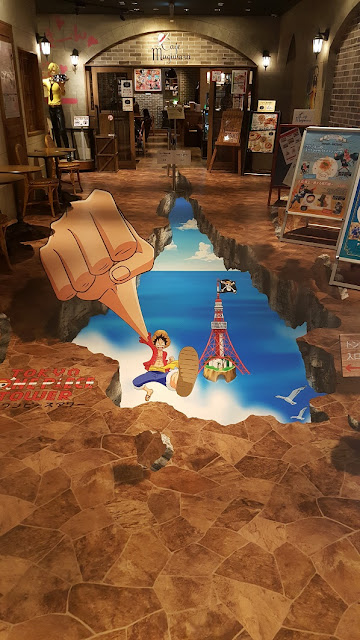 |
| Cafe Mugiwara |
But after looking around, we decided to eat at the Food Court located at the 2nd storey instead. Most of us ordered the Ramen from the Umeiya stall. For those who have been to Japan, you would know that the ordering of Ramen in Japan is mainly by the vending machine. It will dispense the order ticket and we just have to hand that over to their staff and wait for the Ramen to be prepared and served. The stall has English menu, thus it was not a problem placing the order.
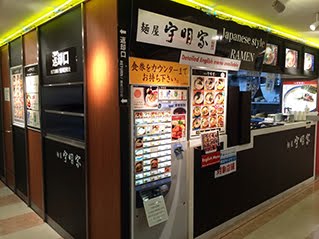 |
| Umeiya Ramen (Source: Photo from tokyotower.co.jp) |
On top of it, we had also ordered pizza from Pizza-La Express and waffle ice-cream from Pink Dot.
 |
| Pizza from Pizza-La Express |
 |
| Waffle Ice-cream from Pink Dot |
Following the same route where we came from, we walked to the Kamiyacho Metro Station (神谷町駅) and took the subway via the Hibya Line, interchange at Ginza Metro Station for the Ginza Line to Ueno-Hirokoji Metro Station (上野広小路駅). Once we got into our apartment, we explored around first since we did not have the opportunity during the earlier check-in. The apartment is clean and modern, but is not very big, which is typical in Tokyo. All the basic necessities were provided, such as toiletries, bath towel, washing machine, cooking utensils etc, which was sufficient for our stay. The apartment also comes with a big balcony, which we did not venture out since it was dark outside. Done with the exploration, we unpacked our luggage, bathe and prepared to sleep.






























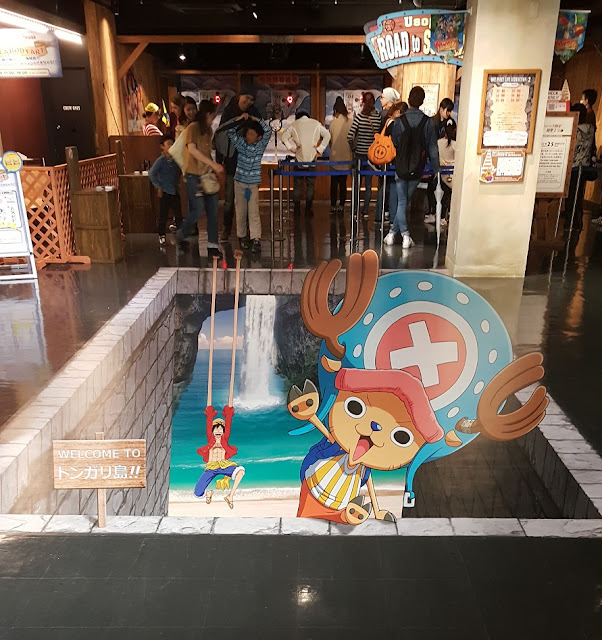

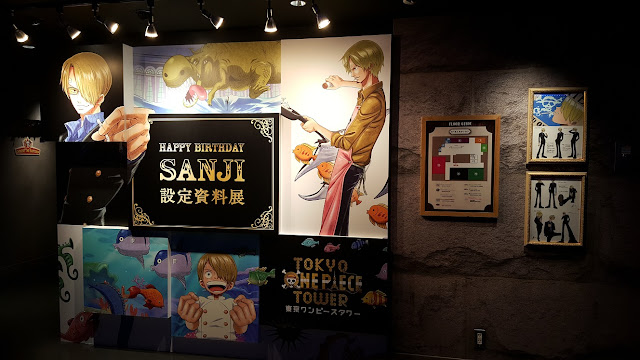
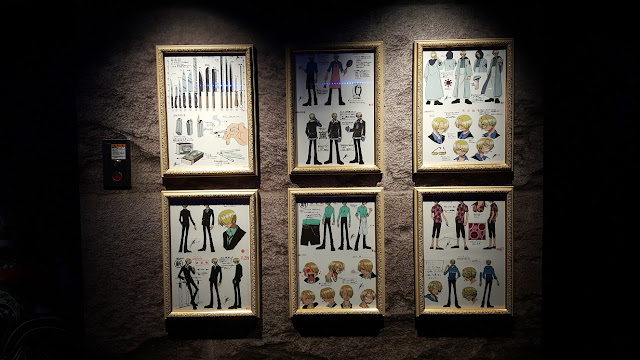














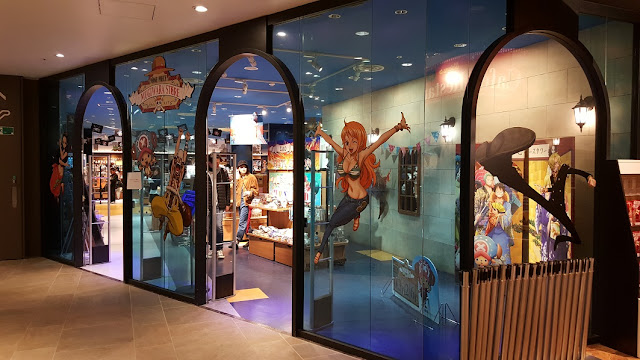

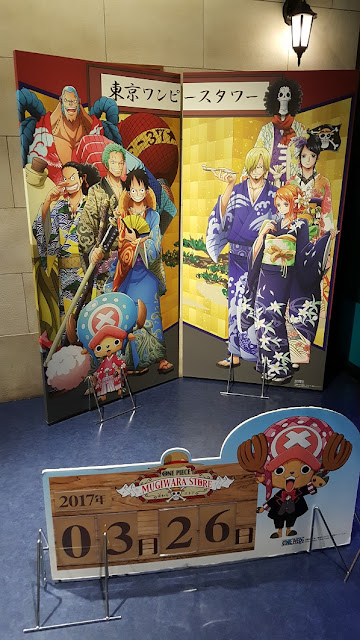


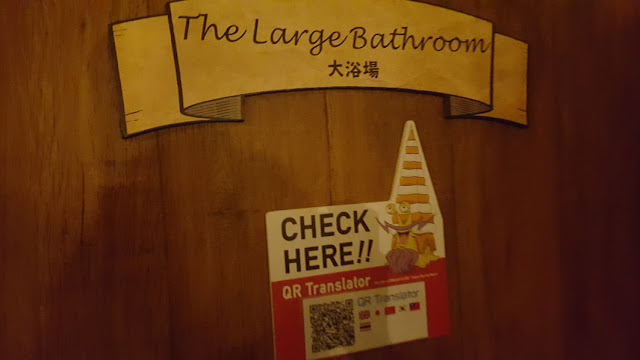

No comments:
Post a Comment